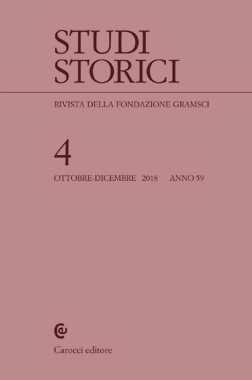
luglio - settembre 2012 anno 53
Sommario e abstract degli articoli
Giovanna Cigliano, pp. 511-557
La «Grande Russia» tra nazionalismo e neoslavismo: l’imperialismo liberale russo come risposta alla crisi patriottica (1907-1909)
Liberal imperialism as a response to the patriotic crisis (1907-1909)
Following The «patriotic crisis» provoked in the Tsarist Empire by the defeat in the war with Japan, the 1905-7 Revolution, and the national mobilization in the non-Russian peripheries, gave a powerful stimulus to the rise of Russian nationalism. New trends of liberal imperialism and national liberalism took shape in a well-defined political area – the right wing of the Kadet Party and the Party of Peaceful Renewal – and were represented by such figures as Grigorij and Evgenij Trubeckoj, Petr Struve, and Sergej Kotljarevskij. The chief points in their political and cultural agenda were an emphasis on inter-Slav cooperation as a crucial factor in a Russian anti-German foreign policy reoriented towards the Balkans and the Near East; a new priority given to the settlement of the Polish question, as compared with the polonophobia of the nationalist Right; and an urgent call for «true patriotism» and national cohesion as essential conditions for a rebirth of Russia as a Great Power. The essay approaches this little explored topic focusing mainly on the liberal imperialists’ contribution to the debates about «Great Russia» and the Russian «national face» and their involvement in the Neo-Slavic movement.
Maria Ferretti, pp. 559-614
Pensare il Gulag: la Russia, la modernità, la rivoluzione bolscevica
Considering the Gulag
The essay analyzes the genesis of the Gulag, placing it at the crossroads of various historical threads: the long spans of Russian history, characterized – starting from the westernising break imposed upon the turbulent nation by Peter the Great – by a special brand of authoritarian or repressive modernization based on forced labour and repression, which was at the origin of the separation between modernity and freedom; the extended, though somewhat less lengthy, duration of European modernism and its crisis, laid brutally bare by World War I; the short spell of Bolshevik revolution, with its particular political culture shaped profoundly by the war; and lastly, the brief flare of socio-political crisis brought on by a fast-paced national shift towards industrialization in the latter half of the 1920s, a prelude to the rise of the Stalin’s dictatorship.
Marco Bresciani, pp. 615-644
Socialismo, antifascismo e tirannie degli anni Trenta. Note sull’amicizia tra Carlo Rosselli ed Elie Halévy
Socialism, antifascism and tyrannies in the 1930s. Notes on the friendship between Carlo Rosselli and Elie Halévy
This article deals with the personal and intellectual friendship between the Italian
antifascist militant Carlo Rosselli (1899-1937), founder of the revolutionary movement «Giustizia e Libertà» and the French scholar Elie Halévy (1870-1937), historian of the English people and of European Socialism between nineteenth and twentieth century. In the 1930s, while Rosselli was in exile in Paris, they had an intense dialogue on socialism, antifascism and tyrannies (especially Fascist and Soviet). This article tries to explain why, in spite of their growing disagreements on Soviet communism, they continued to face off until Rosselli’s murder, focussing on their common antifascist perspective.
Giovanna Savant, pp. 645-669
Antonio Gramsci e Luigi Einaudi
Antonio Gramsci and Luigi Einaudi
During the First World War, while forming his political views, although Gramsci supported the principles of liberism under the influence of Luigi Einaudi, his admiration was at the same time accompanied by severe criticism. Namely, he accused Einaudi of double-dealing: in the magazine La Riforma sociale, only a small number of copies of which were sold, he strongly criticized capitalism and its degenerations, while in the newspaper Corriere della Sera, he preferred to remain silent. In late 1917, Gramsci heightened his polemical attitude towards the liberalists and their main supporter, also by considering them the parties most responsible for the country’s political and economic disorganization, as they had failed in their attempt to spread individualistic philosophy in Italy, which would have allowed the rise of a genuinely liberal government. In 1919, Gramsci rapidly distanced himself from liberalism, because he deemed it was incapable of explaining the alterations produced by the War in social and economic life, and he was convinced that only revolution could save humanity from the abyss into which it had plunged. Einaudi’s name disappeared from his writings at the very moment when L’Ordine Nuovo and the Factory Councils movement caught the attention of economists and of Corriere della Sera. Subsequently, Einaudi was mentioned again, but only in the reflections written in prison, in which Gramsci strongly attacked him for his ideas on the economic crisis, relegating him to a less important position, somewhere down in the circle of the greatest unworthy intellectuals: the loriani.
Delia Salemi, pp. 671-692
«Crisi organica» e Palestina. Un lettura gramsciana
«Organic crisis» and Palestine. A Gramscian reading
The Applying a Gramscian approach to Palestine’s socio-political context, with particular reference to the notions of historical block and organic crisis, this article provides an interpretation of the political and social crisis that has stalled the Palestinian issue, and of the weakening of the Palestinian national movement, whose historical arc has been reconstructed. Following this approach, the national movement’s internal dynamics will be examined in particular, leaving external dynamics – which have, however, influenced and will necessarily affect its transformation, effectiveness and practicability – in the background. The discussion argues that, beginning with the end of the first Intifada and with the start of the peace agreements and the establishment of an effective political/temporal power, the movement for the Palestinian people’s self-determination has embarked on a phase of irreversible decline, marked by a disconnection between the ruling class and the claims it aims to promote, with a consequent loss of consensus and representativeness of the people’s will. This disintegration of the Palestinian national movement thus leads us to recognize an organic crisis in the current situation, just as in Gramsci’s view.
Lorenzo Ettorre, pp. 693-720
La Società antischiavista d’Italia (1888-1937)
«Confidential» or «secret» archival sources for the history of Republican Italy: between norms and practise
This research focuses on the affairs of the Italian Anti-Slavery Society during the
years of its activity. It was founded in 1888 with the purpose of freeing Africans from harsh conditions of slavery, and it remained in continuous operation for about fifty years, until 1937. The Anti-Slavery campaign was launched in Europe by the Cardinal Lavigerie. In accordance with its philanthropic and humanitarian nature, in all the States it brought political awareness of the colonial expansion to sectors of public opinion that would otherwise have been ideologically hostile. In the particular case of Italy, the Anti-Slavery Society brought the Italian State and the Catholic Church together, contributing to their rapprochement on the colonial issue.
Marko Medved, pp. 721-752
L’atteggiamento del vescovo di Fiume Antonio Santin nei confronti dell’autorità fascista (1933-1938)
Bishop of Rijeka (Fiume) Antonio Santin and fascism (1933-1938)
This article focuses mainly on bishop Antonio Santin’s attitude towards fascism during his five-year episcopate in Rijeka (from 1933 to 1938). In the 1950’s, some historians began accusing Santin of being too close to Mussolini’s government during his episcopate in Rijeka, and later Trieste, suggesting he was partly responsible for depriving Croatians and Slovenians of their national rights, and for their Italianization. Some elements of that criticism are still repeated by Croatian and Slovenian secular and church historians today. In Santin’s case, as with other bishops of multiethnic dioceses in this area, one must draw a careful distinction between the free decisions of the Church authority and the decisions of the public (or military) administration. One will, in some cases, find that fascism influenced the Church; however, it should be emphasized that the Catholic hierarchy did not demand, let alone ask, that the government authorities behave unjustly toward the Slavic population as communist historiography claimed. However, Santin did accept some of the Mussolini regime’s propaganda, and responded by sending Italian priests to parishes with Slavic populations, and by imposing Latin as liturgical language. On the other side, he did communicate in Croatian and Slovenian to believers in the hinterland, unlike other Italian bishops of Rijeka, and he increased the number of non-Italians in the cathedral chapter.
Sfoglia gli altri numeri dell’anno 53 / 2012
Elenco dei fascicoli pubblicati dal 2010
Seleziona fascicolo...
- anno 65 / 2024
- 1
- 2
- anno 64 / 2023
- 1
- 2
- 3
- 4
- anno 63 / 2022
- 1
- 2
- 3
- 4
- anno 62 / 2021
- 1
- 2
- 3
- 4
- anno 61 / 2020
- 1
- 2
- 3
- 4
- anno 60 / 2019
- 1
- 2
- 3
- 4
- anno 59 / 2018
- 1
- 2
- 3
- 4
- anno 58 / 2017
- 1
- 2
- 3
- 4
- anno 57 / 2016
- 1
- 2
- 3
- 4
- anno 56 / 2015
- 1
- 2
- 3
- 4
- anno 55 / 2014
- 1
- 2
- 3
- 4
- anno 54 / 2013
- 1
- 2
- 3
- 4
- anno 53 / 2012
- 1
- 2
- 3
- 4
- anno 52 / 2011
- 1
- 2
- 3
- 4
- anno 51 / 2010
- 1
- 2
- 3
- 4
